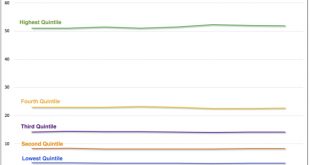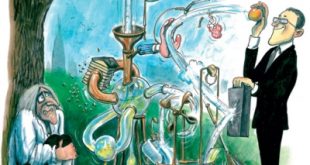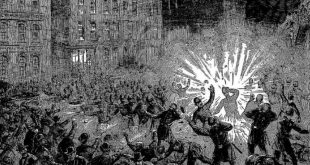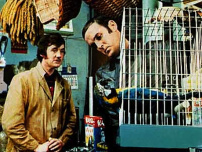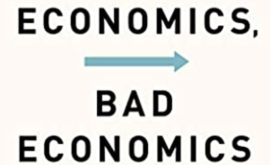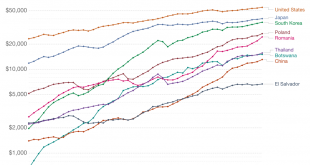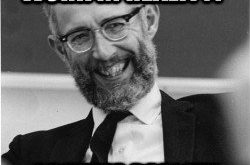from David Ruccio Year 3 of the Trump presidency was absolutely terrific—indeed, record-breaking—for Americans. At least that’s how things look in terms of the headline numbers from the Census Bureau: median household income was up (by 6.8 percent, a record) over 2018 and the official poverty rate decreased (by 1.3 percentage points, to 10.5 percent, the lowest rate observed since estimates were initially published for 1959).* And then there’s Kevin Hassett, former chair of Trump’s White...
Read More »Evidence-based policies
from Lars Syll Evidence-based theories and policies are highly valued nowadays. Randomization is supposed to control for bias from unknown confounders. The received opinion is that evidence based on randomized experiments, therefore, is the best. More and more economists have also lately come to advocate randomization as the principal method for ensuring being able to make valid causal inferences. Yours truly would, however, rather argue that randomization, just as econometrics, promises...
Read More »Modern Monetary Theory
from Asad Zaman This continues from the previous post on Post-Keynesian Response. A large number of contributions from different areas need to be integrated to build an economics for the 21st Century. For an acknowledgement of the failure of 20th Century Macro from one of its architects, see Romer’s Trouble With Macro. This post explains Modern Monetary Theory briefly. Since the time of Keynes, major changes have taken place in the global financial system. Against wishes of Keynes,...
Read More »Beyond the Mainstream
from David Ruccio In this post, I continue the draft of sections of my forthcoming book, “Marxian Economics: An Introduction.” This, like the previous two posts, is for chapter 1, Marxian Economics Today. This is certainly not the first time people have looked beyond mainstream economics. There is a long history of criticisms of both mainstream economic theory and capitalism from the very beginning. Although students won’t have read about them in traditional economics textbooks. Those...
Read More »Expected utility theory — an ex-parrot
from Lars Syll If a friend of yours offered you a gamble on the toss of a coin where you could lose €100 or win €200, would you accept it? Many of us probably wouldn’t. But if you were offered to make one hundred such bets, you would probably be willing to accept it, since most of us see that the aggregated gamble of one hundred 50–50 lose €100/gain €200 bets has an expected return of €5000 (and making our probabilistic calculations we find out that there is only a 0.04% ‘risk’ of losing...
Read More »Trade wars are class wars: even more than Klein and Pettis say
from Dean Baker I have long enjoyed reading Matthew Klein’s columns in the Financial Times and elsewhere. They are invariably insightful and I have learned much from them. I am less familiar with Michael Pettis’ work, but I have liked what I have read. Therefore, I expected a lot from their book, Trade Wars are Class Wars, and I was not disappointed. The basic point is that the major trade imbalances in the world over the last four decades have been driven by the suppression of wage...
Read More »The value of economics — a cost-benefit analysis
from Lars Syll Economists cannot simply dismiss as “absurd” or “impossible” the possibility that our profession has imposed total costs that exceed total benefits. And no, building a model which shows that it is logically possible for economists to make a positive net contribution is not going to make questions about our actual effect go away. Why don’t we just stipulate that economists are now so clever at building models that they can use a model to show that almost anything is...
Read More »A tale of two capitalisms
from David Ruccio Marxian economists recognize, just like mainstream economists, that capitalism has radically transformed the world in recent decades, continuing and in some cases accelerating long-term trends. For example, the world has seen spectacular growth in the amount and kinds of goods and services available to consumers. Everything, it seems, can be purchased either in retail shops, big-box stores, or online. And, every year, more of those goods and services are being produced...
Read More »Friedman-Savage and Keynesian uncertainty
from Lars Syll An objection to the hypothesis just presented that is likely to be raised by many … is that it conflicts with the way human beings actually behave and choose. … Is it not patently unrealistic to suppose that individuals … base their decision on the size of the expected utility? While entirely natural and under- standable, this objection is not strictly relevant … The hypothesis asserts rather that, in making a particular class of decisions, individuals behave as if they...
Read More »Human rights and fiscal policy: a necessary link
from Grazielle David, Pedro Rossi,and Sergio Chaparro and WEA Commentaries Human rights and the economy are intrinsically linked issues. There is an important economic dimension to human rights in terms of the resources needed to guarantee rights and how they can be socially allocated for this purpose. On the other hand, human rights are, or should be, an important normative parameter for the organization of activities and the economic system itself. However, the fiscal implications of...
Read More » Real-World Economics Review
Real-World Economics Review

